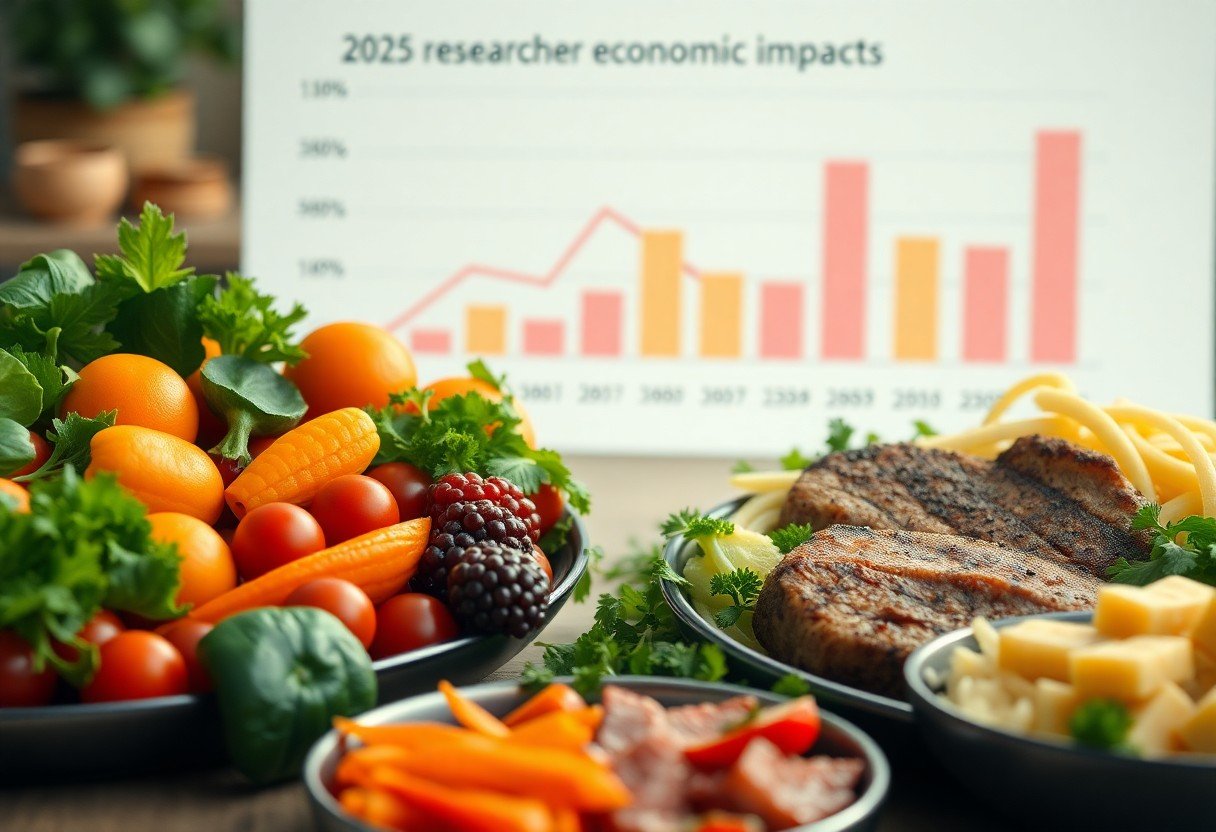Research reveals that your dietary choices significantly impact your health and well-being. The latest findings from 2025 indicate that plant-based diets can lead to lower risks of chronic diseases like heart disease and diabetes, while traditional diets may result in higher rates of weight-related issues. This post will guide you through the key benefits and potential drawbacks of both diets, helping you make informed decisions about what you eat to enhance your overall health.
Key Takeaways:
- Plant-based diets show potential for improved heart health compared to traditional diets, with lower cholesterol and blood pressure levels reported.
- Research indicates that plant-based diets may have a positive impact on weight management and obesity rates.
- Environmental sustainability is a significant advantage of plant-based diets, contributing to reduced greenhouse gas emissions and resource use.
Overview of Plant-Based Diets
Definition and Characteristics
A plant-based diet primarily focuses on consuming foods derived from plants, including fruits, vegetables, nuts, seeds, oils, whole grains, legumes, and beans. It emphasizes whole, minimally processed foods while reducing or eliminating animal products. Characteristics typically include high fiber content, low saturated fat levels, and a rich array of vitamins and antioxidants, which together enhance your overall health.
Types of Plant-Based Diets
There are several types of plant-based diets you can choose from, each defined by what is included or excluded. These include vegetarian, vegan, flexitarian, and whole-food plant-based diets. Each variation allows for different levels of animal product consumption, tailoring your dietary experience to personal preferences and health goals.
| Diet Type | Description |
| Vegetarian | No meat, but may include dairy and eggs. |
| Vegan | Excludes all animal products. |
| Flexitarian | Mainly plant-based, with occasional meat or fish. |
| Whole-food Plant-Based | Focuses on unprocessed or minimally processed foods. |
| Pescatarian | Includes fish but no other meats. |
Each type of plant-based diet can provide various health benefits. For instance, a vegetarian diet can help you reduce the risk of chronic diseases while allowing for greater meal flexibility. Meanwhile, a whole-food plant-based diet can give you the highest nutrient density by focusing on unrefined ingredients. Knowing the differences among diet types helps you choose one that aligns with your lifestyle and health aspirations.
Nutritional Composition
The nutritional composition of plant-based diets tends to be rich in fiber, vitamins, and minerals while being lower in (saturated fats) and cholesterol compared to traditional diets. This composition can significantly improve health by enhancing gut function and supporting weight management.
Plant-based diets allow you to consume a variety of foods that deliver vital nutrients without common additives. For example, legumes offer protein and iron, while leafy greens provide calcium and vitamins A and C. The low glycemic index of whole grains can help you maintain stable blood sugar levels. Knowing this balance can empower you to create meals that sustain your energy and overall well-being.

Overview of Traditional Diets
Definition and Characteristics
Traditional diets consist of foods that are deeply rooted in specific cultures and histories. They are often characterized by local ingredients, seasonal consumption, and preparation methods passed down through generations. The focus is typically on whole, minimally processed foods, which can include meat, grains, dairy, and a variety of fruits and vegetables, tailored to regional availability.
Common Variants of Traditional Diets
Examples of traditional diets include the Mediterranean, Nordic, Asian, and Indigenous diets. Each variant showcases unique foods and cooking methods, reflecting local cultures and climates. These diets emphasize balance and variety, often incorporating herbs and spices that not only enhance flavor but also contribute to health benefits.
The Mediterranean diet, for instance, is rich in fruits, vegetables, whole grains, and healthy fats like olive oil, while the Nordic diet emphasizes seasonal produce, fish, and whole grains native to Scandinavian regions. Asian diets may include rice, vegetables, and soy products, highlighting balance and seasoning with herbs. Each variant supports cultural traditions and offers diverse nutritional profiles.
Nutritional Composition
Traditional diets can be nutritionally dense, often including a wide variety of food groups that provide vital vitamins and minerals. These diets typically have a balanced macronutrient profile, rich in carbohydrates from whole grains and vegetables, proteins from meat, fish, and legumes, and healthy fats.
For instance, the Mediterranean diet features a low-to-moderate caloric intake complemented by healthy fat sources such as fish and nuts, resulting in improved heart health markers. Traditional Asian diets often boast high fiber content from whole grains and vegetables, promoting digestive health. The diversity across traditional diets allows for a rich array of vital nutrients that support overall well-being.
Health Benefits of Plant-Based Diets
Impact on Heart Health
A plant-based diet significantly reduces your risk of heart disease. Research shows that individuals consuming a diet rich in fruits, vegetables, whole grains, and legumes have a lower blood pressure and reduced cholesterol levels. Antioxidants and high fiber content found in plants promote better vascular health, improving blood circulation and reducing inflammation. Adopting such a diet can lead to a striking 32% decrease in heart disease incidence.
Weight Management and Obesity Prevention
Switching to a plant-based diet can greatly assist in weight management. Plant foods are typically lower in calories and higher in fiber, which helps you feel full longer. Studies link vegetarian diets to lower body mass index (BMI) and higher rates of weight loss compared to meat-based diets.
Over time, following a plant-based diet encourages healthier eating patterns, leading you to prefer low-calorie, nutrient-dense foods. This shift is supported by research indicating that individuals on plant-based diets often consume fewer calories overall, which is imperative for maintaining or achieving a healthy weight. Furthermore, the emphasis on whole foods over processed ones not only enhances satiety but also introduces beneficial nutrients, contributing to sustainable weight management outcomes.
Effects on Diabetes Management
Your management of diabetes can improve dramatically with a plant-based diet. Consuming high amounts of fiber-rich foods helps regulate blood sugar levels and increases insulin sensitivity. This dietary approach is linked to a significant reduction in HbA1c levels, a key measure for diabetes control.
Research has shown that transitioning to a plant-based diet can lead to improved glycemic control and possibly decrease the need for diabetes medications. Foods such as legumes, whole grains, and vegetables can stabilize blood sugar levels and offer imperative micronutrients. In fact, a study indicated that participants on a plant-based diet saw a 50% improvement in their diabetes management within a year, highlighting the efficacy of such nutritional strategies.
Nutrient Absorption and Digestive Health
A diet centered on plant foods enhances your nutrient absorption and supports digestive health. The high fiber content aids in promoting regular bowel movements and prevents constipation. Moreover, plant-based diets encourage a diverse gut microbiome, which is vital for optimal nutrient processing.
Many plant foods are rich in prebiotics, which feed beneficial gut bacteria, thereby improving your overall digestive health. This diversity not only boosts nutrient absorption but also supports immunity and overall well-being. Studies have even shown that individuals on plant-based diets have a lower incidence of gastrointestinal disorders and experience improved digestive function, leading to better health outcomes.
Health Benefits of Traditional Diets
Nutritional Adequacy
Traditional diets often provide a comprehensive range of nutrients crucial for your health. They typically include whole foods like grains, fruits, vegetables, lean meats, and dairy, ensuring that you receive adequate vitamins and minerals. A balanced intake from these food groups can help prevent nutritional deficiencies, promoting overall well-being. This is particularly relevant as nearly half of U.S. adults resolve to start a new diet in 2025.
Muscle Repair and Growth
Traditional diets rich in protein sources like meat, fish, and dairy are fundamental for muscle repair and growth. You benefit from high-quality proteins that support muscle synthesis, especially after physical activity. These foods provide the amino acids necessary to rebuild muscle tissues effectively.
Integrating lean meats, eggs, and dairy can significantly enhance your post-workout recovery. Studies indicate that individuals consuming protein-rich diets experience improved muscle mass retention and a quicker recovery time, which is vital for maintaining an active lifestyle. Your body can utilize these proteins to repair damaged muscles and promote growth, optimizing your fitness outcomes.
Energy Levels and Athletic Performance
The combination of carbohydrates, proteins, and fats in traditional diets fuels your energy levels effectively. Whole grains, fruits, and vegetables supply the necessary carbs to sustain endurance during physical activities. This balance is particularly beneficial for athletes or those with active lifestyle demands.
A study demonstrated that individuals who consume a traditional balanced diet experience higher energy levels and performance improvements during workouts. The steady release of glucose from complex carbohydrates helps maintain stamina, ensuring you can perform at your best throughout your activities, preventing early fatigue.
Mental Health and Cognitive Function
Traditional diets can also play a significant role in supporting your mental health and cognitive function. Nutrients found in these diets, such as omega-3 fatty acids, antioxidants, and B vitamins, are crucial for healthy brain activity. You may notice improved mood stability and cognitive clarity when these elements are present in your daily meals.
Research highlights that individuals consuming a diet rich in whole foods experience lower levels of anxiety and depression. The nutrients support neurotransmitter functions, which are crucial for mood regulation. By prioritizing traditional dietary patterns, you can enhance both your mental resilience and cognitive efficiency, leading to better overall health outcomes.

Environmental Impacts
Carbon Footprint of Plant-Based vs. Traditional Diets
When comparing the carbon footprint of plant-based and traditional diets, studies consistently show that the former generates significantly lower greenhouse gas emissions. For instance, adopting a plant-based diet can cut your food-related emissions by up to 50% compared to diets rich in animal products. The livestock sector alone accounts for approximately 14.5% of global emissions, underscoring the environmental benefits of minimizing meat consumption.
Land Use and Agricultural Practices
Land use for food production heavily favors animal agriculture, which occupies vast amounts of land for grazing and feed crops. Switching to a plant-based diet can reduce land requirements by up to 75%, allowing you to contribute to reforestation and biodiversity. Shifting agricultural practices towards more sustainable methods further enhances this positive impact.
Current data shows that producing one kilogram of beef demands about 20 times more land than one kilogram of vegetables. By choosing plant-based options, you not only decrease the strain on agricultural land but also support regenerative practices that can improve soil health and reduce deforestation linked to livestock farming.
Water Consumption and Sustainability
The water needed to produce traditional animal-based foods is staggering; for example, it takes around 15,000 liters of water to produce just 1 kilogram of beef. In contrast, a plant-based diet can reduce your water footprint significantly, as crops like beans or vegetables require just a fraction of that amount, often under 1,000 liters per kilogram.
Investing in a plant-based diet not only conserves water resources but also promotes sustainable agricultural practices. Given the pressing global water crisis, reducing meat consumption can play a vital role in ensuring that freshwater is preserved for future generations. Plus, it encourages practices such as rain-fed cultivation and drip irrigation, which enhance water efficiency across the agricultural landscape.

Economic Considerations
Cost Analysis: Plant-Based vs. Traditional Diets
When evaluating the costs of plant-based and traditional diets, studies from 2025 indicate that plant-based diets can be more economical in the long run. While initial purchases of fresh produce may be higher, the overall cost of health care for plant-based eaters can decrease due to lower rates of chronic diseases. For example, a plant-based diet may save you an average of $750 annually compared to a meat-heavy diet when considering health expenses.
Accessibility and Availability
Access to affordable plant-based options varies widely. Urban areas often boast a wider variety of plant-based products, whereas rural communities may struggle with availability. Supermarkets and local farmers’ markets play a significant role in determining access, sometimes limiting your ability to choose healthy options. For effective dietary choices, accessibility to diverse food sources is vital.
Moreover, purchasing patterns can help identify gaps in accessibility. In lower-income neighborhoods, fresh produce may be less available, leading to an over-reliance on processed foods, which can deter plant-based adoption. Community initiatives focused on urban gardening and farmers’ markets have shown promise in increasing access, offering a sustainable solution for making fresh, nutritious food available to all.
Economic Impact on Agriculture
The shift towards plant-based diets exerts a notable economic impact on agriculture. As consumer demand for plant-based foods rises, traditional livestock farming has seen decreased profitability. In 2025, plant-based alternatives have captured more than 20% of the market, prompting many farmers to adapt their practices or diversify crops to meet changing consumer preferences.
This transition in agriculture promotes sustainability by encouraging practices that prioritize environmental health and biodiversity. For instance, farmers are increasingly exploring crop rotation and regenerative agricultural techniques as they pivot from conventional livestock methods. Such shifts not only create economic opportunities but also contribute positively to ecosystem recovery and resilience.
To wrap up
With this in mind, the 2025 research highlights significant benefits of both plant-based and traditional diets, giving you the opportunity to choose the best fit for your lifestyle. You can gain health advantages, environmental considerations, and personal satisfaction from either diet, depending on your goals and preferences. By assessing the latest findings, you can make informed decisions that enhance your overall well-being and align with your values.
FAQ
Q: What are the key differences between plant-based and traditional diets based on 2025 research?
A: The 2025 research highlights that plant-based diets emphasize fruits, vegetables, grains, and legumes, while traditional diets often include higher amounts of animal products. The research shows plant-based diets may result in lower risks of chronic diseases, while traditional diets can lead to higher levels of saturated fats.
Q: How do plant-based diets affect heart health compared to traditional diets?
A: Studies from 2025 indicate that plant-based diets are associated with improved heart health metrics, including lower cholesterol levels and reduced blood pressure. Traditional diets, particularly those high in red meat, may contribute to increased cardiovascular risks.
Q: What impact do plant-based diets have on weight management versus traditional diets?
A: Research from 2025 suggests that individuals following plant-based diets often experience better weight management outcomes due to higher fiber intake and lower caloric density. Traditional diets may lead to higher caloric consumption and weight gain in some individuals.
Q: Are there nutritional deficiencies associated with plant-based diets, according to recent studies?
A: The 2025 research indicates that while plant-based diets can lack certain nutrients like Vitamin B12, iron, and omega-3 fatty acids, careful planning and supplementation can effectively address these deficiencies. Traditional diets can also contain inadequacies depending on food choices.
Q: What environmental impact differences are noted between plant-based and traditional diets?
A: The 2025 findings emphasize that plant-based diets have a lower carbon footprint and less resource intensity compared to traditional diets. The studies suggest that increasing plant-based food consumption can significantly contribute to sustainability efforts in reducing greenhouse gas emissions.











